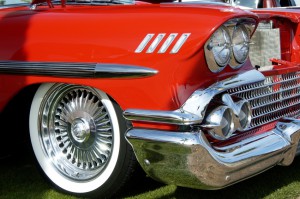Top 5 tips for saving money on your classic car insurance
March 15, 2016
If you own a classic car, insurance is almost certain to prove something of a headache.
For starters, there is no universal or even commonly accepted definition of just what is a classic car. Classic Car Buyer, for example, goes to some lengths to define the essential characteristics:
- it is at least 30 years old;
- it is well maintained and preserved in a state faithful to its origins;
- it is not used for day to day transport; and
- it is part of motoring’s cultural and technical heritage.
But that age might just as easily be 20 or just 15 years, argues the magazine M-Dash, which insists that your definition of a classic car is essentially a “personal viewpoint”.
Unfortunately, that lack of a commonly accepted definition is more than a hoary old chestnut for discussion by classic car enthusiasts, it also throws motor insurers into something of a spin. What is a classic car, they may ask, and, in the absence of a coherent reply, decide to load your insurance premiums to an unacceptable degree.
Follow these 5 top tips about arranging your classic car insurance, however, and you might avoid paying over the odds for the cover you need …
- Choose a specialist provider
- whilst your classic car might throw many a standard motor insurer into a flat-spin panic, here at Alan Blunden Insurance Brokers we have the expertise, experience and familiarity of recognising the vehicle you regard as a classic and arranging specialist insurance accordingly;
- indeed, we might surprise you by showing that insurance for your classic car might actually work out cheaper than the cover you are paying for standard motor insurance.
- Your second car
Your classic car is likely to be something special – a vehicle on which you lavish special care and attention and take out on the road only on special occasions. This is likely to set it apart from the other car you probably own, which is used for the constant, everyday events of going to the supermarket, doing the school run and visiting friends and relatives.
If your classic car is your second car, therefore, many insurers may recognise that it is, by definition, used less often than your daily workhorse – and therefore attracts less of an insurance risk.
The clear lesson, therefore, is to let any insurer for your classic car know that it is your second car – and earn yourself a discount on insurance premiums as a result.
- Mileage
- closely related to this factor is the annual mileage likely to be covered by your classic car – it is likely to be considerably less than the main car your drive;
- you might choose to agree to a low annual mileage, therefore, in return for cheaper insurance premiums;
- the actual limit is a matter between you and your insurer, but might be, say, just 3,000 to 5,000 miles in any year in order to qualify for a discount;
- it is important not to get carried away by any such a bargain, however, because if you exceed the agreed mileage limit and have an accident, your claim might be invalidated.
- Storage
Your classic car is likely to attract special attention, that is one of the reasons you are likely to own it – but not all of that attention might be welcome. Everything you are able to do to keep your classic car from prying eyes and hands, therefore, is likely to be appreciated by your insurer.
Secure storage under cover might be the best way for earning potential discounts, but anything you are able to demonstrate in terms of keeping your classic car safely and securely parked might score you valuable points when it comes to calculating the premiums you need to pay.
- Excess
Just as with your own main car – or, indeed, practically any type of general insurance – if you share more of the risks, your insurer shoulders less of them and typically repays you by reducing the cost of premiums.
The way to do it is simply to accept a greater uninsured risk by agreeing to a higher excess – the first part of any claim for which you remain financially responsible.
Although there may be no universally accepted definition for a classic car, most of us – and especially you, the owner – recognise one when we see one. And the fact that it is a classic presents no barrier in terms of negotiating or identifying ways of reducing the insurance on the vehicle.